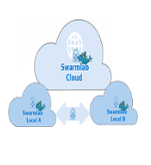5.2 KiB

Swarmlab Hybrid
Table of contents
Swarmlab Hybrid is the Swarmlabs younger, more tech savvy brother.
Swarmlab hybrid provides the user with the unique abillity to create and share project images and even full-blown systems. An all of that using onlly the browser and the command line of their system.
Why?
Ever created a service that you would like to test on a real-world network?
Ever designed an application you would like to distribute to your friends/students?
Swarmlab Hybrid comes to fill in the gap between the coder/developer of a service and the and user and at the same time meet the needs for a real-world testing environment.
With Hybrid we can now as part of the cloud work independantly but also stay connected.
The hybrid format allows us to utilize the power of Swarmlab itself but also combine it with the practiaclly unlimited computing of our own machines.
How?
How does Swarmlab Hybrid differ from Swarmlab? Well...its Swarmlab...just....HYBRID!
Easy enough right? But what does that mean in practice?
Well for us it means a couple million more lines of code. For you it means a few more installation steps and the newfound access to YOUR OWN RESOURCES!
You will be connected to the Swarmlab Cloud (hence HYBRID) but you will be able to use your own storage(move files around, delete/copy etc),your own networking and computational power(cpu/graphics etc) and create a system exactly the way you need it.
This way you will be able to :
- create images for testing.
- Run them using docker.
- Share them for others to use and develop.
- Finally browse a the cloud for shared images to integrate into your project and make it even better.
Swarmlab vs Swarmlab Hybrid in a nutshell
Swarmlab
- Ready to use virtual labs
- Optimized for both Students and Tutors
- Tutors bootstrap their labrooms using our tools
- Students can join the created labrooms according to their interrests
Hybrid
- Run and manage applications
- Scale up or down without rebuilding
- Connect multiple computers through a network.
- Move Labs between environments
- Create your own labs
System requirements
Before you create and configure a hybrid deployment using the swarmlab-agent client, your Local Machines need to meet certain requirements.
If you don't meet those requirements, you won't be able to complete the steps within the swarmlab-agent client and you won't be able to configure a hybrid deployment between your Local Enviroment and Swarmlab Online Enviroment.
- A Linux Server (Virtual or Physical)
- You must have super user privileges (root/sudo)
- Docker Engine- Community version 18 or later is required.
- Docker Engine is supported on x86_64 (or amd64), armhf, and arm64 architectures.
- RAM
- Absolute minimum to run the daemon and some very light containers - 512MB
- Minimum for “comfortable” usage – 2GB
- CPU
- Minimum: 2
- Recommended 4+
- Disk Space
- 10 GB for internal requirements.
- The amount of additional disk space soloemnly depends on you intended use.
⚠️ Since Doecker uses hyupervisor the host NEEDS TO HAVE VIRTUALIZATION ENABLED!
Prerequisites
-
node version >15
curl -sL https://deb.nodesource.com/setup_15.x | sudo -E bash - sudo apt-get install -y nodejs -
docker
curl -fsSL https://download.docker.com/linux/ubuntu/gpg | sudo apt-key add - sudo add-apt-repository "deb [arch=amd64] https://download.docker.com/linux/ubuntu $(lsb_release -cs) stable" sudo apt update sudo apt install -y docker-ce sudo usermod -aG docker [USERNAME] -
docker-compose
sudo curl -L "https://github.com/docker/compose/releases/download/1.27.4/docker-compose-$(uname -s)-$(uname -m)" -o /usr/local/bin/docker-compose sudo chmod +x /usr/local/bin/docker-compose sudo ln -s /usr/local/bin/docker-compose /usr/bin/docker-compose -
pm2
sudo npm install -g pm2 -
wireguard
sudo apt install wireguard jq
Installation
- Clone the repo
git clone --recurse-submodules https://git.swarmlab.io:3000/zeus/swarmlab-hybrid.git
-
Install it!
cd swarmlab-hybrid ./install.sh -
Open URL http://localhost:3088 in browser
-
Get a Swarmlab account.
-
Get a free API Key at Settings->Enable the Swarmlab hybrid Menu
More Info
You can find our docs in docs Directory
The Swarmlab docs are in AsciiDoc (similar to markdown), PDF and html format
For real-time rendering in browser Asciidoc an add-on can be found here:
